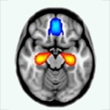Tuesday, 30 June 2015
The Physiology of Expanded Consciousness

The results of some studies are exactly what you would have predicted, but that doesn’t make them any less interesting. For example, the study reported in the link below found that taking psilocybin (the psychoactive substance in “magic mushrooms”) puts the brain in a state that is conducive to freer associations, somewhat as in dreams. (more…)
The Emergence of Consciousness | Comments Closed
Tuesday, 9 June 2015
The McGurk Effect: An Auditory Illusion

This week’s post will be brief, so that you can get out and enjoy the start of summer and the restoratjve effects of nature, but the subject is very intriguing.
Have you ever heard of the McGurk effect? It’s an auditory illusion that shows just how much our brains construct our auditory perceptions not only from what we hear but also from what we see.
In the case of spoken words, what we see is the mouth of the person who is talking to us. (more…)
The Senses | Comments Closed
Wednesday, 27 May 2015
The Evolution of Language, From Animals to Analogy

Language is a communication tool that relies very heavily on analogy. In fact, according to Douglas Hofstadter and Emmanuel Sander, authors of Surfaces and Essences: Analogy As the Fuel and Fire of Thinking (2013), analogy plays a fundamental role in the very way we think.
Hofstadter now admits that when he wrote his book Gödel, Escher, Bach: An Eternal Golden Braid, which is full of daring analogies and became something of a cult in the 1980s, he had not really explored all the implications of analogy as a way of transferring knowledge from one field to another. Today, however, he regards analogy as central to all human experience. (more…)
From Thought to Language | 2 comments »
Wednesday, 13 May 2015
Preserving Our Bodies and Minds from the Ills of Civilization

For several hundreds of thousands of years, human beings lived and evolved in small groups of hunter-gatherers whose environment was the natural world. It is only for the past 10,000 years or so that we have lived first in villages, and then in cities. Today, a large proportion of us live in megalopolises and work in factories or offices where we have little contact with nature. And what is worse, our contacts with one another are becoming more and more virtual, and our emotional bonds weaker and weaker.
Thus, over what is a very short timespan from an evolutionary standpoint, the human body and the human brain, shaped by a natural environment very different from our own, have had to adapt to a very radical change in environment. And, it would seem, the further our urban way of life departs from the ways of our hunter-gatherer ancestors, the more our physical and mental health suffers.
That is the argument made by John Ratey, co-author of the book Go Wild: Free Your Body and Mind from the Afflictions of Civilization, in an interview by Ginger Campbell in the last episode of his podcast Books and Ideas. (more…)
Body Movement and the Brain | Comments Closed
Monday, 27 April 2015
The Impression of Déjà Vu.

This week we’d like to suggest some readings on a strange phenomenon that people may experience when travelling, among other occasions: the impression of déjà vu.
The first link below describes just one example of this phenomenon: you are touring a castle in a country that you are visiting for the first time, when suddenly you have the impression that you have been there before. But after the tour, while visiting the castle’s gift shop, you see a postcard with a photo of the castle, and you realize that a movie that you saw several years ago was shot there. The two experiences seemed too distant or disjointed in your memory for you to make the connection explicitly, but they were close enough for you to have an implicit sense of familiarity. (more…)
The Emergence of Consciousness | Comments Closed







